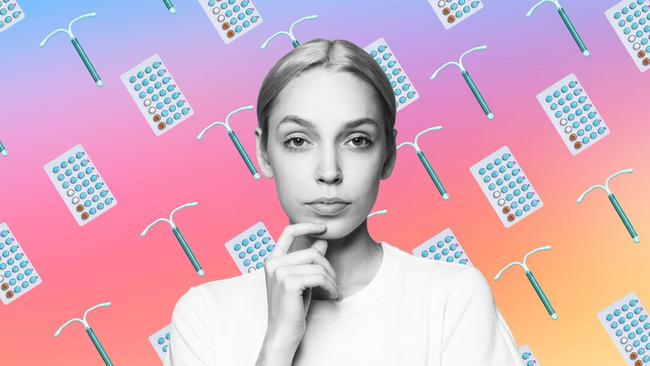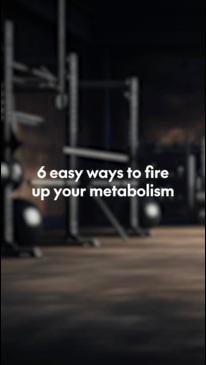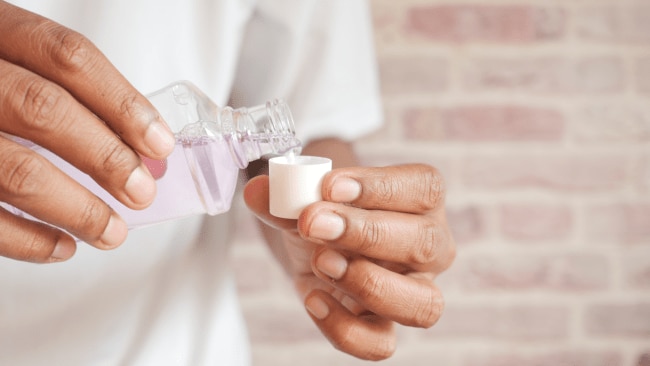Is female contraception outdated?
There are other options

Lifestyle
Don't miss out on the headlines from Lifestyle. Followed categories will be added to My News.
While various hormonal contraceptives are available, it's time we took a look at just how relevant they are, especially for women with chronic health conditions, writes Laura Roscioli.
I was sitting in the park the other day with a new friend. We got introduced through a mutual friend because we both have endometriosis.
I’ve found that the best way to feel seen and understood when it comes to our bodies, as women, is to connect with other women who have gone through similar things. Chronic health conditions - especially within the reproductive system (like PCOS and endometriosis) - share a common experience of both being extremely painful and isolating. Not only is the pain invisible, but there’s still so much we don’t know. We got onto the topic of contraception.
“I don’t use anything except condoms anymore!” She told me, with exasperation. “My body wasn’t responding well to any of them. They’d help the pain, but the side effects were so troublesome, that it just wasn’t worth it.”

Like what you see? Sign up to our bodyandsoul.com.au newsletter for more stories like this.
I’ve had a similar experience. Having tried multiple contraceptive pills and the Mirena IUD, my body wasn’t feeling balanced. While, like my new friend, I had lower amounts of physical abdominal pain and cramping, the hormonal side effects like fatigue and anxiety were heightened to the point of daily struggle.
I can’t even count the amount of times I’ve felt 'off', and have been told that it’s stress and/or hormone-related. I’ve suffered from serious brain fog, fatigue, abdominal pain, joint pain and extreme depressive dips. Honestly, these are the kind of side effects that make you feel crazy - especially when no one (including your GP) can give you a straight answer on what might be going on inside your body.
But maybe that’s just the nature of hormones, and there’s still so much we - and society in general - don’t know.
After our conversation, I got thinking about whether other women I know who suffer from chronic reproductive conditions have also thrown in the towel on hormonal contraception. And, if so, is contraception the problem? Is hormonal contraception outdated?
Let's talk about hormonal contraception
According to clinical naturopath Freya Lawler, hormonal contraception will continue to be the generic GP recommendation, given its affordability and accessibility. However, that doesn’t always mean it’s the best option.
“Hormonal contraception is affordable and accessible regardless of your socio-economic status, which is very important,” she tells Body+Soul. “It's also often but not always effective for a large range of hormonal complaints. Ultimately, there are not many other interventions in a GP or gynecologist toolbox that may potentially ameliorate a wide range of hormonal symptoms like PMS, PMDD, pain, heavy bleeding and acne.”
This means that when consulting with your doctor, a hormonal contraceptive is a likely recommendation and will continue to be, says Lawler.
“The conventional medical system is built around symptom management versus addressing root causes to achieve a long-term resolution. Therefore, hormonal contraceptives fit this criteria.”
As a society, it makes sense that we have a common recommendation that works pretty consistently for most people. Especially one that is both affordable and accessible.

But, what if hormonal contraception gives you negative side effects?
If you’re like me, and hormonal contraception’s negative side effects outweigh its positives - it’s hard to know where to turn. Our bodies, as women, often feel like a puzzle even to us. There needs to be more research into why hormonal contraception impacts some people negatively and some not at all, says Lawler.
This comes down to the complexities and nuances of our hormone systems and how much they differ for each individual, as well as the growing research, knowledge and insight we’re gaining within mental health.
“It appears that those who are most vulnerable to mood changes on hormonal contraceptives are those with active depression, a history of depression or low mood on other hormonal contraceptives. However, there are likely mechanisms of action we are yet to fully understand.”
Lawler says that it’s crucial mental health is discussed in detail when unpacking the links between depression and some contraceptives.
“Mental health is often ignored in these circumstances and unfortunately can lead to poor health outcomes. Practitioners must also recognise these impacts and validate their patients’ observations. General community education and better information are urgently needed for primary healthcare practitioners regarding the relationship between oral contraceptive pills and depression and low mood.”
Kin Fertility GP Dr Kirsty Hallace-Wor, says that she finds that a lot of people who have had issues with hormonal contraception feel gaslit about their concerns and often aren’t fully aware of the alternatives.
She says that she most often gets asked about the negative side effects of hormonal contraceptives, due to the stigma, the experience of others and concerns surrounding fertility.
“Sometimes these concerns are easy to address – for example, if you get nausea with the pill, it can help to take it at night. If you get breakouts or mood swings during your period, you can try skipping your period with the pill.
“However, sometimes side effects are persistent or severe, and a patient may opt to change contraceptives or stop altogether. Some people also like to give their body 'a break' from external hormones. This isn’t medically necessary – most forms of contraception are safe to take in the long term and don’t affect fertility – however, I know there are lots of social media personalities spruiking this.”
But overall, there’s lots to understand and unpack about your own body - both physically and mentally - to understand why hormonal contraception may not be working for you, and if it’s right for you.
Lawler says we can ask ourselves “How much are your current concerns impacting you and how might the side effects of inhibiting ovulation impact you? Which is the lesser of two evils and what other alternatives are available to address your needs?”
And to find those answers, you might need to look outside your regular GP.
“Resetting our expectations as to what can be achieved through conventional medicine is very important,” she says. “Leaning on allied health when it's needed is an integral consideration.”
She also adds that it takes approximately 17 years for scientific research to trickle down into what is being executed in general practice. So, if research around women’s health and mental health is only emerging now - and within the last decade or so - they won’t hit new-wave GPs for almost another decade.

So, what are the best alternative contraceptive options?
According to Dr Wallace-Ho, if you’ve tried various hormonal contraceptive options and have had persistent issues with all of them - there are other options.
“The copper intrauterine device is extremely reliable, reversible and doesn’t contain any hormones. Condoms are also 98 per cent effective at preventing pregnancy when used perfectly,” she says. “And, if someone has completed their family, tubal surgery or vasectomy may be suitable.”
“Further, if you have a condition that you were treating with hormonal contraception, such as endometriosis, polycystic ovarian syndrome, or premenstrual dysphoric disorder, it’s important to discuss alternative treatments with your GP.”
These could include going to see a specialist, like Lawler herself.
It’s important to acknowledge that investing in specialists and allied health care isn’t something that everyone can afford to do. Although I’m someone in the working middle class and live a privileged life in a privileged part of the world, even I get overwhelmed by the cost of finding things out about my body.
This is why it’s crucial that we talk to each other out loud about our experiences. Passing on knowledge is power. Dr Wallace-Ho says that there are newer forms of contraception too, but they aren’t available in Australia yet.
These include “the combined contraceptive patch, a self-administered progesterone injection, and more progesterone-only pills”.
“Unfortunately, the registration process for new contraceptives in Australia can be lengthy and expensive, meaning that we are a bit behind other countries in terms of contraceptive options.
“There are also no hormonal male contraceptives registered in Australia, despite promising trials showing that there are effective options. This means that women continue to bear most of the mental load, cost, and potential side effects of contraception.
“We know the effect that contraception has on hormone levels – however, this doesn’t always equate to someone’s experience with contraception. People respond differently to hormones. For example, people with premenstrual dysphoric disorder have normal concentrations of estrogen and progesterone in their blood; however, they may have an abnormal neurotransmitter response to changes in these hormones. This is why it is hard to predict how someone will respond to different forms of hormonal contraception, and why the information from your doctor may sometimes feel limited.”

Is it OK to not use contraception at all?
I used to feel guilty for not wanting to take contraception. Hormonal contraception is one of the things, throughout history, that have allowed women the freedom of choice. So, to choose not to take it, felt reckless.
Plus, many of my friends would shame or guilt me about it, in my early twenties. “You’re crazy!” they’d say. “What if you get pregnant?”
But to me, the negative side effects have impacted me far more than a potential pregnancy. Plus, I’ve always been comfortable in managing my cycles and fertility naturally.
Lawler says that support and education around this can help us to go without hormonal contraception, safely.
“Many women and those AFAB (assigned female at birth) individuals have never been validated or supported in their decisions on body autonomy. And for many, it’s still an uphill battle,” she says. “Condoms, the fertility awareness method, the male contraceptive pill, and vasectomy are all excellent options to consider if you are in a heterosexual relationship.”
“By educating young women and those AFAB about the nuances of their menstrual cycle and to understand and detect their windows of fertility (the 5 days per month you can fall pregnant) we might instil greater confidence in women and those AFAB to manage their cycles and fertility naturally.
“Simply providing good education, options and support for women and those AFAB surrounding decisions for their body is crucial, whether they decide to go on hormonal contraceptives or not.”
More Coverage
Originally published as Is female contraception outdated?




